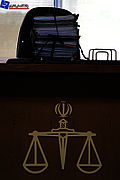1980s Prisoners Resubjected to Islamic Punished
» Exclusive Rooz Report on New Death Sentences
The increasing death verdicts issued for unknown prisoners on the charge of moharebeh [enmity with God] and the quick passage or upholding of these allegations by appellate courts has raised the concerns of families who have political prisoners. In these cases, the court rulings are communicated to the prisoners’ attorneys appointed by the court. In many cases, the families have no access to these attorneys. Moreover, several political prisoners from the 1980s are among the ones sentenced to death. Rooz has prepared an exclusive report on the condition of these prisoners after speaking with their families.
According to the latest reports, appellate courts upheld the execution sentences of Jafar Kazemi and Mohammad Ali Hajaghaei, two individuals arrested during popular protests, and the verdicts now await execution. Similarly, appellate courts approved the execution verdicts of Mohsen Daneshpour-Moghaddam and Ahmad Daneshpour-Moghaddam. The sentences of these two were upheld by appellate courts. But according to new procedures set by Iran’s Supreme Court two weeks ago, moharebeh convictions can only be reviewed by the Supreme Court.
Currently, at least 9 individuals arrested after the disputed 2009 presidential election have been sentenced to death on the charge of moharebeh: Mohammad Amin Valian, Mottahareh Bahrami, Mohsen and Ahmad Daneshpour-Moghaddam, Reyhane Haj-Ibrahim, Hadi Ghaemi, Abdolreza Ghanbari, Jafar Kazemi and Mohammad Ali Hajaghaei. The prosecutor has requested the death sentence for Masoumeh Yavari, but the court has not issued it ruling yet.
Aside from Mohammad Amin Valian, the 20-year-old Damghan University student and activist, who was sentenced to death on the charge of moharebeh for simply carrying and throwing rocks, all the other individuals are alleged to have been members of the Mojahedin Khalq Organization (MKO), who were charged as being mohareb and were given death sentences by the courts.
Ever since the protests that followed the announcement of the 2009 election, the Islamic Republic alleged that the MKO were behind the massive popular street protests. The state security apparatus has arrested several members of the MKO, their relatives or family members, along with several 1980s political prisoners, who had completed their prison terms and who have stated that they were not politically active. The Islamic Republic is said to have arrested these individuals in order to create the impression that the popular unrest was fomented by the MKO.
An investigation by Rooz revealed that the majority of individuals recently sentenced to death either have relatives who are members of the MKO or have a history of political activism and convictions in the 1980s.
Some of these individuals had left the country for Iraq to visit their children and had then freely returned to Iran. These very individuals had been the target of arrest since the post June 2009 presidential elections turmoil, and many received heavy prison sentences.
Hadi Ghaemi, the spokesperson for the International Campaign for Human Rights in Iran says, “How can someone be convicted for having political activism or convictions on his record? Unfortunately, Ahmadinejad’s interior ministry and the Revolutionary Guards try to connect the popular protests to the MKO entirely, while the street protests were homegrown and weren’t connected to any specific group.”


